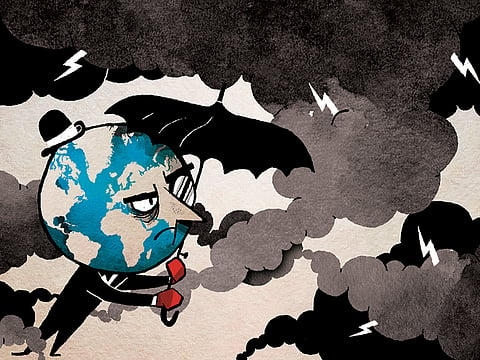All eyes now on the battle against Daesh
Recent attacks reveal the group’s alarming reach in Europe and the wide range of its operational capabilities

On Friday, November 13, with its horrific attacks across Paris that destroyed so many lives, the so-called Islamic State or Daesh (the self-proclaimed Islamic State of Iraq and the Levant) declared war on the international community. The question now is how will the global community respond to this audacious challenge.
Daesh is under pressure in Iraq and Syria — Sinjar was re-taken by Kurdish Peshmerga forces last week and an assault on Ramadi is underway — but has responded by embarking on a new, transnational, phase. In less than a month, the group has carried out four major attacks abroad: First came the downing of Russian Metrojet Flight 9268 over Sinai, in which all 224 on board were killed; next, the group praised a Jordanian policeman who shot dead six people, including two American contractors, at a United States government-funded training facility in Amman; on Thursday, two suicide bombers killed 43 and wounded hundreds more in Beirut; and then on Friday, an eight-strong Daesh cell targeted six locations across Paris with suicide bombers and gunmen, killing at least 129 people.
Apart from the carnage, these terrible attacks are alarming for another reason: They reveal the extent of Daesh embeddedness in Europe and the wide range of its operational capabilities. The Paris attacks would not have been possible without logistical support from accomplices in Europe providing transport, weapons, ammunition and explosives. Police have already arrested suspected conspirators in Belgium and Germany and one of the assassins was a French national. In addition, the wave of migration currently underway from Africa to Europe provides the militants with new opportunities to penetrate European security measures. One of the suicide bombers who targeted music fans at the Bataclan concert hall had been processed as an asylum seeker in Greece only a few weeks ago.
Saturday’s Vienna conference on Syria took place under the shadow of the Paris massacre and what to do about Daesh swiftly rose to the top of the agenda.
Although they could not agree on the fate of Syrian President Bashar Al Assad, the 17 nations that gathered in Vienna shared what the German foreign minister called a “common determination to fight Daesh” and backed French Foreign Minister Laurent Fabius’s call for “co-ordinated international action on Daesh”.
The conference tasked Jordan with identifying a list of groups that all nations present would accept were terrorist organisations. This will certainly include Daesh and Al Qaida affiliate Jabhat Al Nusra and is significant because the list will be used to obtain an official United Nations Security Council endorsement for external military action against these legitimate targets.
The five permanent members of the UN Security Council (Britain, France, United States, Russia and China) also pledged to support a UN ceasefire-monitoring mission in Syria and clarified that this would not cover action against Daesh and Jabat Al Nusra — a further indication that a co-ordinated international operation against the extremists was being planned.
Security vacuum
So what form will the battle against Daesh take? The 8,000 bombing sorties already flown by coalition and Russian planes have made little overall impact on the group’s strength and presence. The obvious question is whether or not soldiers should be deployed on the ground. Kurdish battalions have twice defeated Daesh in major battles — at Kobani and at Sinjar — and President Hollande implied that France would be prepared to send troops. Russia is sufficiently bellicose to provide boots on the ground, but Britain and the US are much less eager to expose their troops to such a vicious enemy, particularly in the aftermath of costly, failed adventures in Afghanistan, Iraq and Libya, which only made the problem of extremism worse by providing exactly the chaotic security vacuum in which groups like Al Qaida and Daesh thrive.
The Paris attacks may have galvanised France and Russia, but it has sent shivers of dread through other nations who fear that increased strikes on Daesh targets will only enrage the beast further.
The West has every right to ensure that its citizens are kept safe, but that is best done at home. Western interventions in the Middle East are the root cause of the current regional turmoil and the rise of Daesh. Most western countries refuse to recognise their role, individually or collectively, in providing incubators for this uniquely dangerous terrorist phenomenon. The West engaged in unjustified and totally destructive military interventions, attempting to fragment nation states and redraw the map of the Middle East. And all of this was done in pursuit of their own financial and diplomatic agendas with the additional aim of leaving Israel as the only regional superpower. But no amount of anger over the past will solve the current, overriding problem, of what to do with Daesh.
In the short term, I think we will see the US and Russia coordinating their efforts to contain Daesh in Syria and Iraq, while the details of Syria’s transition — and crucially the future of Al Assad — are thrashed out. If a ceasefire is achieved between the Syrian regime and the opposition, the Syrian army can be deployed against Daesh. In that paradoxical scenario, the West — having funded and armed the opposition — would find itself fighting on the same side as the very regime it sought to topple.
And who would have thought that the monstrous fruit of the womb of Al Qaida would force the US and Russia to march together against a common enemy — something that has not happened since the end of the Second World War.
Abdel Bari Atwan is the editor-in-chief of digital newspaper Rai alYoum. He is the author of The Secret History of Al Qaeda; A Country of Words, his memoirs; and Al Qaeda: The Next Generation.



